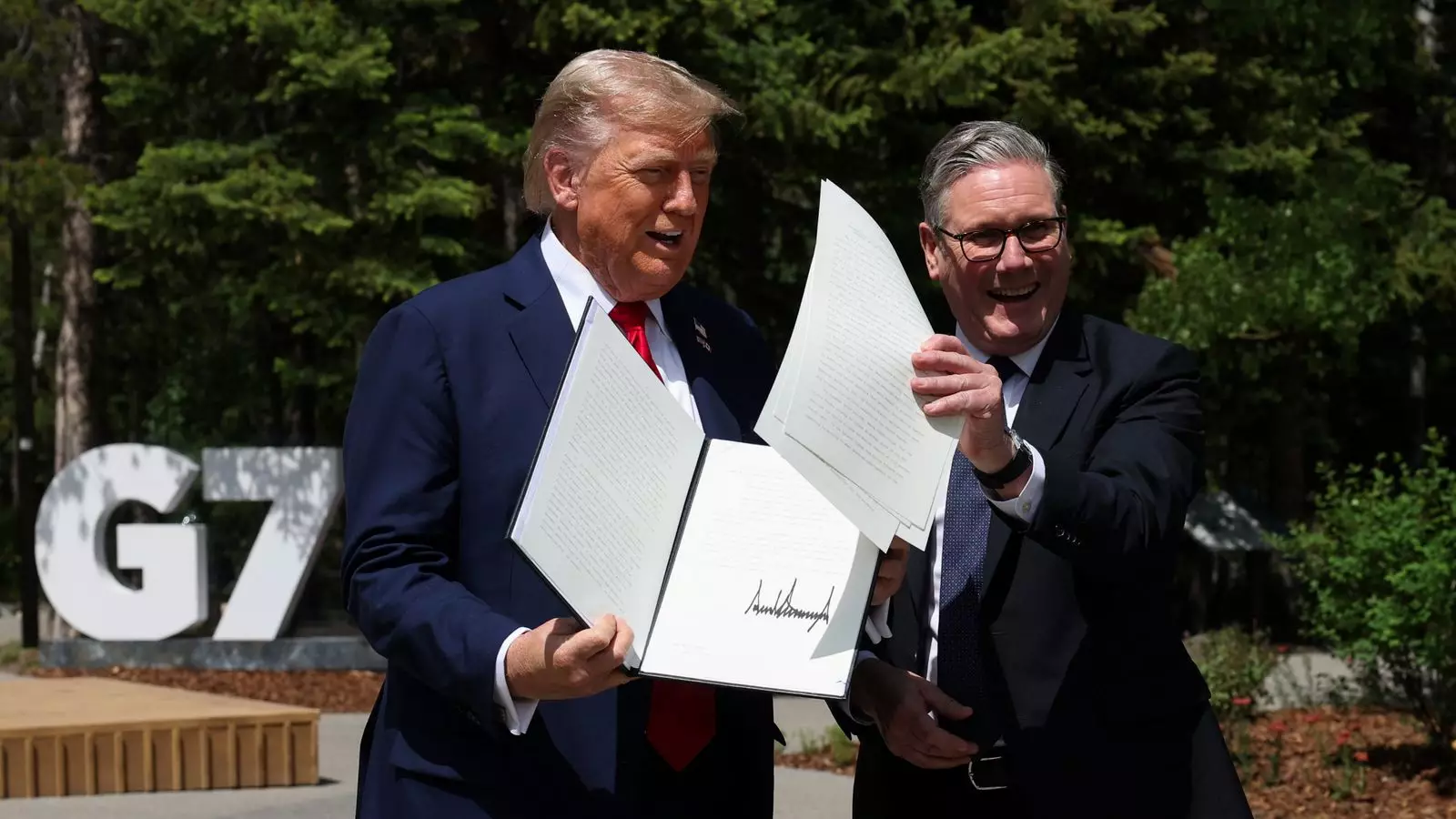At first glance, the recent announcement of a completed UK-US trade deal evokes a sense of triumph. US President Donald Trump, flanked by the UK Prime Minister Sir Keir Starmer during the G7 summit, claimed the agreement was “done” and heralded it as a pathway to job creation and economic prosperity. It’s crucial to acknowledge that such proclamations often draped in optimism can be misleading. What may appear as a solid, fair deal to some, masks a landscape riddled with uncertainties and potential pitfalls.
The juxtaposition of the two political figures can confuse the public. While Trump touted the deal’s benefits, asserting that it cuts tariffs on vital sectors like cars and aerospace, there lingered an unmistakable ambiguity about specifics, particularly concerning tariffs on British steel. This inconsistency embodies a broader issue; policy announcements designed to rally public support often lack detail or concrete substance. The enthusiasm displayed on that stage rings hollow when juxtaposed with the reality that trade agreements often serve as vehicles for political posturing rather than truly beneficial economic arrangements.
The Politics of Ambiguity
Trump’s comment that the UK is “very well protected” against future tariffs, thanks to his fondness for Britain, raises eyebrows. Let’s consider this assertion: the mere reliance on personal affection as a basis for economic stability is a precarious foundation. The complexity of international trade policies requires robust frameworks, not whimsical favorites. It’s almost laughable that a deal can be presented as beneficial when critical questions about the impact on industries, especially one as crucial as steel, remain unanswered.
Moreover, the interchange between Trump and Starmer reveals a dynamic that’s more theatrical than substantial. When Trump mistakenly referred to a “trade agreement with the European Union,” it signaled a disconnection from reality—a possible indication that his administration’s grasp on international trade is as tenuous as his ability to keep his statements aligned with facts. Any major agreement should transcend personal relationships and partisan politics; economic stability should not hinge on a whimsical friendship predicated on charisma.
The Pitfalls of Superficial Agreements
While it’s tempting to revel in the idea of a thriving economy boosted by a trade deal, we must question the underlying integrity of this agreement. Starmer’s eagerness to embrace the notion of a “really important agreement,” without sufficient scrutiny, is disheartening. A liberal leader should champion comprehensive policies rooted in equitable standards, rather than merely delight in the superficiality of political success.
The trade deal’s reduction of tariffs can certainly be celebrated, but we must not overlook the broader implications of such agreements. They encompass principles concerning labor rights, environmental protections, and consumer safety. When leaders enthusiastically proclaim victory, it’s crucial to challenge them on what they’ve truly delivered for the workers and consumers back home. Unfortunately, there is a pattern where deals are often marketed as monumental shifts, all while ignoring deeper issues.
The Ethical Quandaries of Trade Policies
The ethical considerations surrounding trade deals cannot be overlooked. The celebrated benefits of lowered tariffs are often overshadowed by the consequences of an ever-globalizing market. The promise of job creation is enticing, yet the type of jobs that emerge can sometimes perpetuate economic inequality and labor exploitation. It’s a fine line between fostering economic growth and sacrificing the welfare of vulnerable populations.
A truly progressive and liberal approach to trade would seek to ensure that agreements benefit not only the affluent entrepreneurs but also the everyday worker. The narrative should evolve beyond merely cosmetic achievements, pushing instead for thorough evaluations that prioritize sustainable and equitable economic practices.
The UK-US trade deal, while cloaked in bravado, demands a critical evaluation that transcends the optimistic rhetoric of its proponents. It invites us to scrutinize the true intentions behind these agreements and to advocate for policies that uphold the values of fairness and inclusivity. This is a vital conversation we must continue as we navigate the complexities of modern global trade.

Leave a Reply